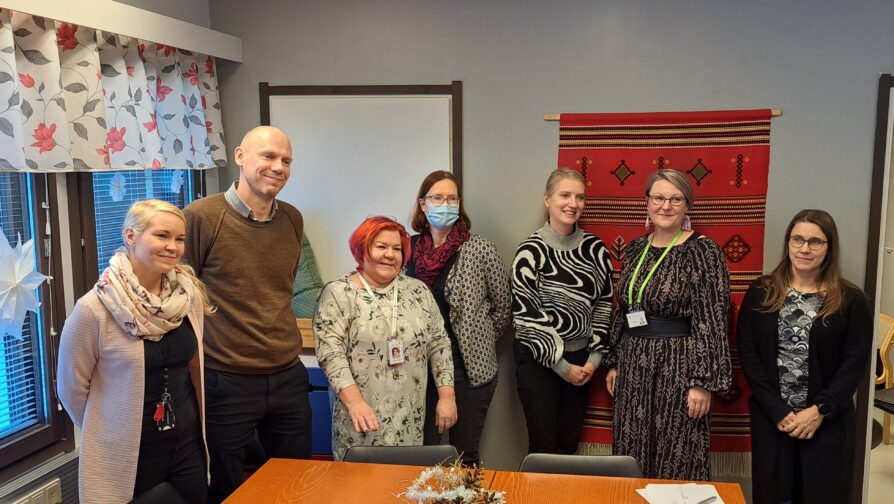Congolese refugees performing at community space Sopukka in Rautjärvi.
In late November 2023, Senior Durable Solutions Associate Erika Löfgren visited the community sponsorship pilot programme in Simpele, Rautjärvi, in south-eastern Finland. The pilot was initiated in January 2023 and is funded by the Asylum, Migration and Integration Fund of the EU. Led by the Finnish Red Cross, the programme offers a way for refugees to connect with local volunteers, groups and communities and build mutual relationships to support their reception and integration. While most of the practical integration needs are provided for by public authorities, social and leisure activities are organised by the group of volunteers with the newcomers, supporting the newly arrived refugees to build a network and find their feet in a new environment.
UNHCR’s Löfgren praises the municipality’s community engagement efforts that have paid off by creating a welcoming society for newly arrived refugees. Rautjärvi invests in fostering a good community spirit, and building on the already existing structures and groups has been part of the success of the programme, explains Sarianne Honkanen from the Finnish Red Cross – the key is to build pathways to access existing communities. “It’s the simple things that the refugees themselves ask for, like for someone to come with them to the football club so that you don’t have to go alone”, tells Honkanen.
The refugees in Rautjärvi are all Congolese and were resettled from Zambia. The shared background and culture have been helpful for them in supporting each other to settle in a new, vastly different environment. A community space called Sopukka, an important site for interaction and building social bonds for refugees and locals alike, is used by the refugee community to pray and observe sermon that everyone is welcome to attend. Regular interaction with locals is important for learning the challenging language outside of the classroom. Being able to speak Finnish is crucial for taking part in local politics through the municipal council, for example: during Löfgren’s visit, the refugees themselves expressed their wish to contribute more to the local community and Finnish society in general.
It’s the simple things that the refugees themselves ask for, like for someone to come with them to the football club so that you don’t have to go alone.
Importantly, the community sponsorship pilot is a mutually beneficial project for both the refugees and the municipality: better local integration means that refugees are more likely to stay in the town and vitalize the local community. Rautjärvi locals are enthusiastic about the inclusion of the newcomers, and for example the refugees’ choir group has been a frequent part of the village’s public events and has performed at birthday parties. During her visit, UNHCR’s Löfgren also got to enjoy a song and dance performance. In a mutual exchange that followed, the group expressed gratitude to the Rautjärvi community for welcoming them, and local officials and residents thanked the refugees for bringing in positive energy and encouraging locals to defeat the culture of isolation of a small town. “It makes you reflect – thinking that only a few generations ago, our Finnish culture was much more communal and social, too”, says FRC’s Honkanen.

Rautjärvi municipality’s integration instructor Jenni Aho, Mika Alakontiola from the Ministry of the Interior, Sarianne Honkanen of The Finnish Red Cross, Rautjärvi vitality and project developer Sini Javanainen, UNHCR’s Senior Durable Solutions Associate Erika Löfgren, South Karelia’s director of the integration of immigration services Katri Vänttinen, and Rautjärvi’s welfare secretary Elina Suntila.
Community-based sponsorship programmes are an emerging durable solution for refugees that helps foster inclusive societies. Originating from Canada, the community sponsorship model has gained increasing interest throughout Europe in recent years. A government-commissioned feasibility study on the potential of community-based sponsorship in Finland was carried out in 2021. Adapted models tailored to specific country contexts have been successfully piloted across the region, including in the Nordic countries.
Read more on UNHCR’s work on community sponsorship programmes here.
Share on Facebook Share on Twitter